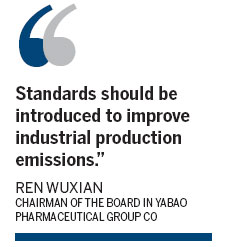 Large Medium Small
Large Medium SmallAs heavy smog continues to blanket most of China's northern and central regions, Shanxi province, North China's coal hub, has pledged to restore and protect the natural environment through reforestation programs and cleaner technologies.
Zhu Xiaoming, director of the province's State-owned Assets Supervision and Administration Commission, announced the planned improvements during a panel discussion on Monday.
"Coal modernization is the key way to transform our coal industry. Coal-to-liquid fuel has a much higher efficiency than oil, and the particulate matter from the combustion of this fuel is 80 percent less than that from the combustion of oil. This has very great significance in easing the heavy smog hovering over China," he said.
Shanxi is China's leading production base for coal, a major source of energy for the country's economic boom over the past few decades. The province accounts for a quarter of China's coal production and reserves.
Coal output last year reached 960 million tons, of which more than 64 percent, or 620 million tons, was transported and consumed outside the province.
However, the burning of coal is thought to be a major contributor to heavy smog with a heavy concentration of particulate matter.
"We are the country's energy base, but we are also often known as the coal base," said Li Xiaopeng, governor of the province.

Shanxi is an important supplier of power to the country, but its current power generation capacity only accounts for 5 percent of the country's total, much lower than its contribution as a supplier of coal to the rest of the country, he said.
The province's deputies put forward a suggestion to the NPC, stating that improvements to Shanxi's power facilities would benefit the environment.
"Stepping up the province's power delivery facilities and enhancing the proportion of power output have very great significance in easing pollution and protecting the ecological environment in the regions of North, Central and East China," they said.
Deputies also requested that the central government approve the construction of three power transportation lines connecting Shanxi to Beijing and Tianjin and the provinces of Hebei and Jiangsu.
Meanwhile, the governor of Shanxi also pledged to promote the use of clean energy technologies, including wind power, solar power and hydropower. The Yellow River passes through the province, providing a potentially huge source of hydropower.
He also said coalbed methane would be promoted, since it is cleaner than either coal or oil. The province produces 8 billion cubic meters of coalbed methane annually, about 5 percent of the country's total, according to Li.
He pledged to develop coalbed methane into the main source of energy in the province, supplying 20 million of Shanxi's population of 36 million by 2015, compared with 10 million now.
Ren Wuxian, chairman of the board in Yabao Pharmaceutical Group Co, advised the government of Shanxi province to take effective measures to ease the heavy smog across the country.
"Standards should be introduced to improve industrial production emissions. The standards for fuels and oil should be enhanced and the standards for exhausts should be established to remove obsolete plants and vehicles," Ren said.
Responsibilities should also be clarified for increasing the amount of afforested land each year. What's more, the fight against smog should be listed as a key parameter in the evaluation of governments at all levels, he said.
Li Xiaobo, chairman of Taiyuan Iron and Steel Corp, said, "Advancing energy conservation and environmental protection should be a compulsory move in getting rid of overcapacity. The key is establishing universal standards for environment protection. The technology has made great progress and the only issue is the cost."
Coal mining in the province has caused great ecological damage in previous decades. The mining of 1 metric ton of coal will create water drainage of 2.4 tons, which means an ecological cost of 87 yuan ($14.2), said Yuan Chunqing, the province's Party chief.
But he noted that, in the past four years, the province has spent about 10 billion yuan per year on reforestation projects. Around 300,000 hectares have been planted with trees, accounting for a 1 percentage point increase in forest cover each year.
Contact the writer at [email protected]